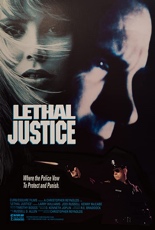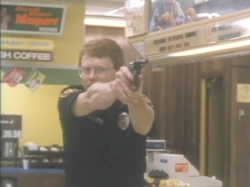
 After writing an article about a sheep birthing a human baby, Populous magazine reporter Jill Weatherby (Jodi Russell, Blind Dating) and her shoulder pads thirst for “a shot at some real news.” She finds it in sleepy Edmond, Missouri — a town that’s “fictious,” per the misspelled credits — where the elderly, married owners of a mini-mart have been murdered by a trio of traveling hoodlums. While one of the the bad guys (Kenny McCabe, Silent Night, Deadly Night Part 2) remains at large, rogue cop Cliff Madlock (Larry Williams, 2001’s Heartbreakers) fatally shot the others at the scene.
After writing an article about a sheep birthing a human baby, Populous magazine reporter Jill Weatherby (Jodi Russell, Blind Dating) and her shoulder pads thirst for “a shot at some real news.” She finds it in sleepy Edmond, Missouri — a town that’s “fictious,” per the misspelled credits — where the elderly, married owners of a mini-mart have been murdered by a trio of traveling hoodlums. While one of the the bad guys (Kenny McCabe, Silent Night, Deadly Night Part 2) remains at large, rogue cop Cliff Madlock (Larry Williams, 2001’s Heartbreakers) fatally shot the others at the scene.
What Jill doesn’t know initially is that one of Madlock’s kills was a straight-up execution — Miranda rights, schmiranda rights. Edmond boasts a crime rate 40% lower than the U.S. average, yet almost never convicts a criminal. She learns why after witnessing Madlock break into a drug dealer’s house — warrant, schmarrant — and force-feeds spoonfuls of cocaine to the dealer as if it were Cheerios.
 Maybe it’s the experience of watching Lethal Justice through a 21st-century lens, but it’s not clear whether Madlock is supposed to be its hero or villain — until the ending, when Weatherby watches Madlock blow away the elusive criminal (“Damn! There goes my exclusive!”) and decides to let the good ol’ boy in blue keep shooting first and asking questions
Maybe it’s the experience of watching Lethal Justice through a 21st-century lens, but it’s not clear whether Madlock is supposed to be its hero or villain — until the ending, when Weatherby watches Madlock blow away the elusive criminal (“Damn! There goes my exclusive!”) and decides to let the good ol’ boy in blue keep shooting first and asking questions later never. Hey, it was a very different time.
It was also a time when anything could churn profits on VHS, no matter how homegrown. Lethal Justice represents the second and thus far final film from writer/director/producer/editor Christopher Reynolds. As with his debut, the Johnny-come-lately slasher Offerings, it was shot in the Oklahoma City area (including the actual city of Edmond) using its fair share of overemoting locals and exaggerated extras, but also with Russell believably exhibiting that journalist’s pluck, just as Williams does with hotheaded authority; however, they fail to click in the chemistry department. All one can really ask of such cinematic pursuits is an effortless watchability, which Lethal Justice provides, no matter how hard its secondhand-synthesizer score — appropriately referred to by the closed captioning as “sleuth music” — works against it. —Rod Lott
